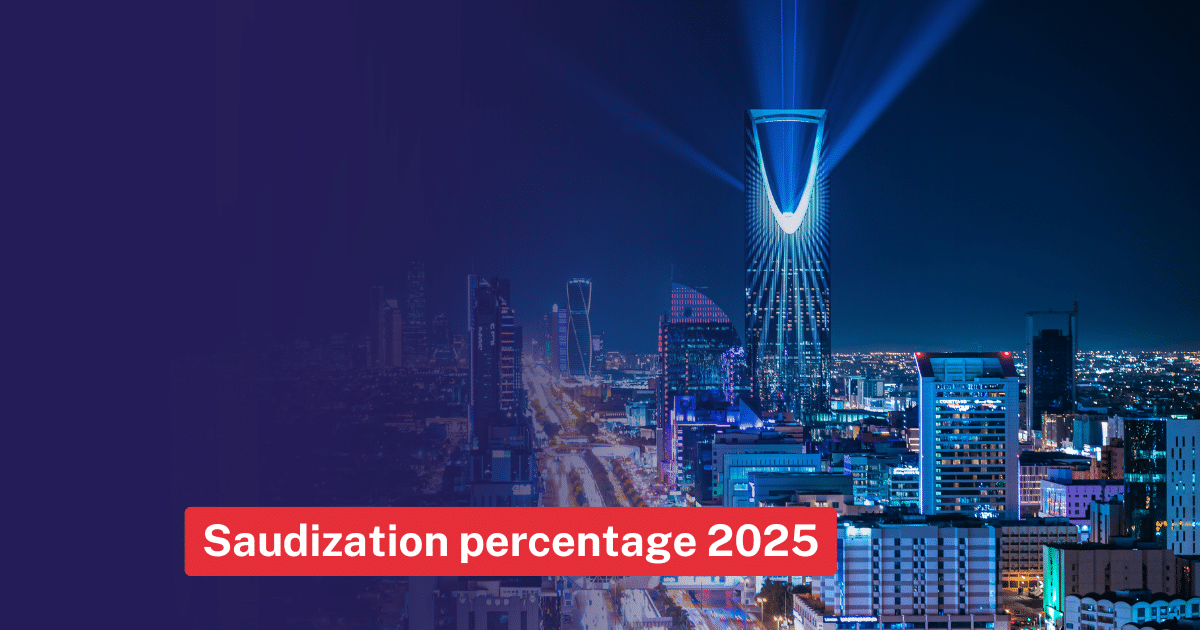Saudization, also known as Nitaqat, is a key initiative by the Saudi government aimed at reducing unemployment among Saudi nationals and ensuring that the workforce in the Kingdom is increasingly composed of Saudi citizens. This policy has a profound impact on businesses operating in Saudi Arabia. Understanding Saudization and its implications is crucial for any company that wishes to establish or maintain operations in the Kingdom.
In this comprehensive guide, we will explore everything you need to know about Saudization in 2024, including the Saudization percentage requirements, the Nitaqat system, how to maintain compliance, and how Business Link can support you in staying compliant with Saudization regulations.
What is Saudization?
Saudization is the national policy of Saudi Arabia designed to encourage the hiring of Saudi nationals over expatriates. The goal is to create a more self-reliant workforce and reduce the dependency on foreign labor. The initiative is structured around the Nitaqat System, which categorizes businesses based on the percentage of Saudi nationals they employ. For businesses operating in Saudi Arabia, complying with Saudization policies is crucial to maintaining their legal standing and being eligible for various government services and support.
Saudization in 2024: What You Need to Know
In 2024, Saudization continues to be a pivotal part of Saudi Arabia’s Vision 2030, which aims to diversify the economy and reduce the Kingdom’s dependency on oil exports. The focus remains on increasing the employment of Saudi citizens in both private and public sectors, as well as enhancing their skills to meet the demands of modern industries. Key updates in 2024 include more stringent enforcement of the Nitaqat system and potential changes to the percentage requirements based on industry sectors. It is crucial for businesses to stay updated on these changes to ensure compliance.
What is the Right Saudization Percentage?
The Saudization percentage refers to the required ratio of Saudi nationals to expatriates in a business. The percentage varies by industry and business size. In general, the Saudization percentage requirement ranges from 20% to 80%, with the requirement for larger companies being more stringent. Here’s a breakdown of what you can expect:
- Small businesses: May be required to employ at least 20% Saudi nationals.
- Medium businesses: May need to employ around 40% to 60% Saudi nationals.
- Large enterprises: The requirement may go as high as 70% to 80% depending on the industry.
For certain sectors such as IT, healthcare, and engineering, the Saudization requirements tend to be higher due to the need for skilled labor. Therefore, it’s essential to understand your industry’s specific Saudization requirements to avoid penalties.
What is the Main Goal of Saudization?
The main goal of Saudization is to reduce the unemployment rate among Saudi nationals, improve their skill sets, and increase their participation in the workforce. Saudization also aims to:
- Develop local talent: Provide more career opportunities for Saudi citizens.
- Boost the national economy: Encourage Saudis to actively contribute to economic growth, reducing reliance on foreign labor.
- Support Vision 2030: Align with Saudi Arabia’s long-term goals of economic diversification and sustainability.
By implementing these objectives, Saudization helps to create a more self-sufficient workforce while promoting the development of key industries in Saudi Arabia.
What is the Nitaqat System?
The Nitaqat system is a color-coded classification system introduced by the Saudi Ministry of Human Resources and Social Development (HRSD) to evaluate a company’s compliance with Saudization policies. It categorizes businesses into different levels based on the percentage of Saudi employees they have:
- Green: A business that meets or exceeds the required percentage.
- Yellow: A business that is below the required percentage but has not fallen into the red zone.
- Red: A business that has not met the Saudization percentage requirement and is considered non-compliant.
The Nitaqat system determines a business’s eligibility for work visas, government contracts, and other business benefits. A company’s Nitaqat status directly influences its ability to hire expatriates and access various government incentives.
What Affects Your Nitaqat Category?
Several factors determine your company’s Nitaqat category, including:
- The percentage of Saudi nationals employed: This is the most direct factor affecting your Nitaqat status. The higher the number of Saudi employees, the higher your rating.
- Company size: Larger companies have higher Saudization targets and therefore face stricter requirements.
- Sector and industry: Some sectors, such as healthcare, engineering, and IT, have more stringent Saudization requirements.
- Company performance: Businesses that hire more skilled Saudi workers in line with market demands are considered more compliant.
Staying within the required Saudization levels and improving your Nitaqat status can improve your company’s standing with the government and help avoid penalties.
How to Keep Your Nitaqat Status Green?
Maintaining a green Nitaqat status requires consistent efforts. Here are some key tips:
- Prioritize hiring Saudi nationals: Focus on employing Saudi workers and ensuring they are in positions that require local talent.
- Regularly assess your Saudization levels: Regularly monitor your company’s Saudization percentage to ensure it stays within the required levels.
- Training and development programs: Invest in the development of your Saudi employees through training programs to help them advance in their careers and meet skill requirements.
- Streamline HR processes: Implement efficient HR practices that prioritize compliance with Saudization policies.
By following these strategies, your company can maintain its green status and access government benefits and support.
The Nitaqat Red Range: What Does It Mean?
If your business falls into the red Nitaqat range, it means you are not in compliance with Saudization requirements. This can have serious consequences, including:
- Fines and penalties: Companies in the red category may be fined by the government.
- Limited access to work permits: You may face difficulties in hiring expatriate workers.
- Reduced eligibility for government contracts: Non-compliant businesses may lose access to government projects and funding opportunities.
If your business is in the red category, it is essential to take immediate steps to make your nitaqat green.
How Can Business Link Help You Stay Compliant with Saudization?
At Business Link, we specialize in helping businesses navigate the complexities of Saudization and the Nitaqat system. Here’s how we can assist:
- Consultation and advice: Our experts can guide you in understanding the Saudization percentage requirements for your industry.
- Hiring solutions: We assist in recruiting Saudi nationals and aligning your workforce with Saudization targets.
- HR support: Business Link provides ongoing HR support to ensure that your company maintains a green Nitaqat status.
- Government liaison: We act as a liaison with the Saudi government to ensure compliance with all regulations.
Partner with Business Link to ensure that your business remains compliant with Saudization, and avoid penalties while contributing to Saudi Arabia’s economic growth.
Conclusion
Understanding and adhering to Saudization is essential for businesses in Saudi Arabia. By staying compliant with the Nitaqat system and meeting the required percentages, businesses can ensure long-term success and access to vital government services. Business Link is here to help you through every step, from understanding the regulations to maintaining your Nitaqat status.
If you are ready to take your business to the next level and lunch business setup in Saudi Arabia, contact Business Link today for expert advice and support on Saudization and Nitaqat compliance.






